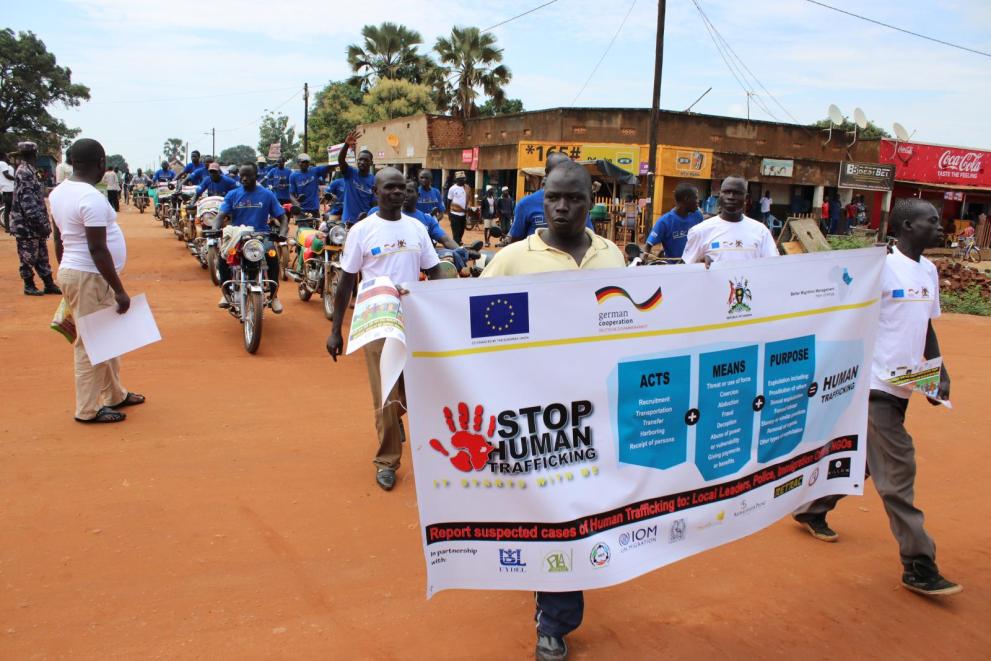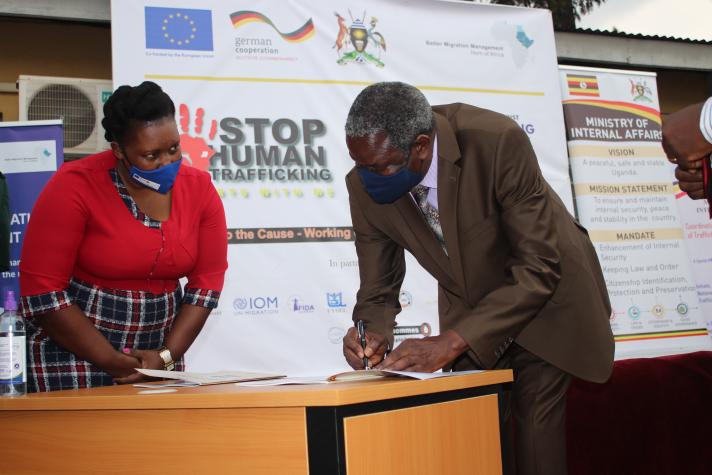
Uganda is battling with the menace of human trafficking. Men, women and children are trafficked from rural communities to large cities like Kampala for labour and sexual exploitation. Others, who seek better job opportunities in the Middle East, are often recruited under vague contractual conditions that can encourage subsequent abuse by human traffickers. And people from East African states are also trafficked to or through Uganda for different forms of exploitation.
Community awareness is key to prevent human trafficking
‘It is shocking to discover that local communities and families unwittingly aid the crime of human trafficking,’ says Lydia Bwiite. Lydia is a dynamic legal practitioner who works at the Platform for Labour Action, a Ugandan civil society organisation (CSO) that focuses on promoting and protecting the rights of vulnerable and marginalised workers.
In her experience, ongoing, consistent and focused public and community awareness of human trafficking is central to prevention. ‘Our people put their relatives and acquaintances into the hands of human traffickers, believing that they are helping them to get a job and a better chance in life.’ adds Lydia: ‘This level of ignorance remains the greatest threat to efforts to combat human trafficking.’
Between 2014 and 2019, Ugandan CSOs rehabilitated over 2,000 victims through aftercare programmes, including providing vocational skills training to around 1,500 victims and offering nearly 500 work experience placements. Victims have thus been able to “re-start” their lives and find stability: some have set up businesses; others have got married and started a family… Some victims have become strong anti-trafficking advocates themselves and even been hired as staff members by CSOs.
A coalition of CSOs to fight human trafficking
Lydia’s organisation, the Platform for Labour Action, is one of more than 40 members of the Uganda Coalition against Trafficking in Persons (UCATIP). The coalition was set up in 2012. It is a network of CSOs seeking to create a society free from human trafficking.
‘We are a civil society platform for a united voice against trafficking in persons. We come together and build capacity so that we can support and provide services to victims,’ says Annette Kirabira, Director of Rahab, a CSO launched twelve years ago to provide holistic protection services for trafficked girls and young women.
UCATIP organises training and capacity development in the area of identifying victims of trafficking and investigating cases of human trafficking. ‘Our major challenge is now to strengthen UCATIP’s strategic role. We have to ensure our sustained relevance and expertise, including consistent operational standards and quality services to protect people against all forms of exploitation,’ explains Annette Kirabira.
Support with developing legal and policy frameworks
‘As a coalition, we have legal recognition and legitimation from government,’ notes Lydia Bwiite. ‘We now have two permanent representatives on the National Prevention on Trafficking in Persons Committee, and this is a huge win for civil society.’
Through its representation on the Committee, UCATIP is also supporting the development of legal and policy frameworks to mitigate human trafficking in Uganda. UCATIP collaborates with the Coordination Office for Prevention of Trafficking in Persons (COPTIP) within the Ugandan Ministry of Internal Affairs.
The network contributed to the implementation of the National Action Plan 2019-2024 for the Prevention of Trafficking in Persons in Uganda. It also participated in the development of the National Referral Guidelines for assistance of victims of trafficking. Both were launched in July 2020.
Background
The Better Migration Management (BMM) programme funded by the EU Trust Fund for Africa and the German Federal Ministry for Economic Cooperation and Development (BMZ) is supporting UCATIP with implementing its strategic plan and provides training for members of Ugandan CSOs in referring vulnerable migrants and victims of trafficking to appropriate shelters and other service providers delivering legal aid and medical and psychosocial support. The programme also supports CSOs in improving their services. BMM has also supported the development and dissemination of the National Action Plan for Prevention of Trafficking in Persons and of the National Referral Guidelines for Management of Victims of Trafficking.
UCATIP’s five years milestones status report: https://www.ucatip.org/wp-content/uploads/2021/09/UCATIP-REPORT.pdf
Details
- Publication date
- 25 October 2021
- Region and Country
- Horn of Africa
- Uganda
- Thematic
- Improved migration management
- Partner
- GIZ

